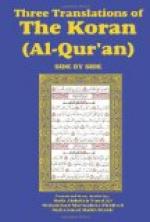It must be acknowledged, too, that the Koran deserves the highest praise for its conceptions of the Divine nature, in reference to the attributes of Power, Knowledge, and universal Providence and Unity-that its belief and trust in the One God of Heaven and Earth is deep and fervent-and that, though it contains fantastic visions and legends, teaches a childish ceremonial, and justifies bloodshedding, persecution, slavery, and polygamy, yet that at the same time it embodies much of a noble and deep moral earnestness, and sententious oracular wisdom, and has proved that there are elements in it on which mighty nations, and conquering though not, perhaps, durable-empires can be built up. It is due to the Koran, that the occupants in the sixth century of an arid peninsula, whose poverty was only equalled by their ignorance, become not only the fervent and sincere votaries of a new creed, but, like Amru and many more, its warlike propagators. Impelled possibly by drought and famine, actuated partly by desire of conquest, partly by religious convictions, they had conquered Persia in the seventh century, the northern coasts of Africa, and a large portion of Spain in the eighth, the Punjaub and nearly the whole of India in the ninth. The simple shepherds and wandering Bedouins of Arabia, are transformed, as if by a magician’s wand, into the founders of empires, the builders of cities, the collectors of more libraries than they at first destroyed, while cities like Fostât, Baghdad, Cordova, and Delhi, attest the power at which Christian Europe trembled. And thus, while the Koran, which underlays this vast energy and contains the principles which are its springs of action, reflects to a great extent the mixed character of its author, its merits as a code of laws, and as a system of religious teaching, must always be estimated by the changes which it introduced into the customs and beliefs of those who willingly or by compulsion embraced it. In the suppression of their idolatries, in the substitution of the worship of Allah for that of the powers of nature and genii with Him, in the abolition of child murder, in the extinction of manifold superstitious usages, in the reduction of the number of wives to a fixed standard, it was to the Arabians an unquestionable blessing, and an accession, though not in the Christian sense a Revelation, of Truth; and while every Christian must deplore the overthrow of so many flourishing Eastern churches by the arms




